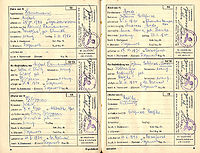
| Home | Sources Directory | News Releases | Calendar | Articles | | Contact | |
Ahnenpass
The Ahnenpass (literally ancestor passport) documented the Aryan lineage of citizens of Nazi Germany. It was one of the forms of the Aryan certificate (Ariernachweis).
The term Aryan in this context was used in a sense widely accepted in scientific racism of the time, which assumed a Caucasian race which was sub-divided into Semitic, Hamitic and Aryan (Japhetic) subraces, the latter corresponding to the Indo-European ethno-linguistic phylum. Nevertheless, the de facto primary objective was to eliminate Jews from all high positions in German society.
The investigation for lineage was not obligatory as it was a major undertaking to research the original documents for birth and marriage. Many Nazi followers had already begun to research their lineage even before law required it (soon after the NSDAP took power on 30 January 1933).
One important law which was issued on 7 April 1933 (after the Nazi assumption of power) was called the Law for the Restoration of the Professional Civil Service, and it required all public servants to be of "Aryan" descent. The law, however, did not define the term "Aryan" and a subsequent regulation was issued on 11 April 1933 as the first legal attempt by the Third Reich to define who was, and who was not, a Jew. The implementing decree followed the pre-Nazi trend found in the Aryan Paragraph[1] and read in pertinent part that:
–žAls nicht arisch gilt, wer von nicht arischen, insbesondere jüdischen Eltern oder Großeltern abstammt. Es genügt, wenn ein Elternteil oder ein Großelternteil nicht arisch ist. Dies ist insbesondere dann anzunehmen, wenn ein Elternteil oder ein Großelternteil der jüdischen Religion angehört hat.'
Those are not Aryans who descend from non-Aryan, especially Jewish, parents or grandparents. It is sufficient (grounds for exclusion) for one parent or grandparent to be non-Aryan. This is particularly assumable if a parent or grandparent adhered to the Jewish religion.
The applicable fields were later enlarged under different laws to include lawyers, teachers, medical doctors and finally requiring a proven Aryan lineage even to attend high school or to get married. Usually, the lineage was investigated four generations back.
The Ahnenpass was not public record - the document was shown where required and returned to the bearer.
As a result, genealogical research particularly flourished in Germany during the Third Reich.
[edit] See also
- Nuremberg laws
- German Blood Certificate
- Nazi eugenics
- Racial policy of Nazi Germany
- Mischling
- Mischling Test
[edit] Literature
- Der Ahnenpaß des Ehepaares. Verlag für Standesamtswesen, Berlin 1939.
- Eric Ehrenreich: The Nazi Ancestral Proof: Genealogy, Racial Science, and the Final Solution. Bloomington, IN: Indiana University Press, 2007. ISBN 978-0-253-34945-3
- Cornelia Essner: Die –žNürnberger Gesetze' oder Die Verwaltung des Rassenwahns 1933'1945. Schöningh, Paderborn 2002, ISBN 3-506-72260-3.
[edit] Footnotes
- ^ The Nuremberg Laws would eventually supersede the "one grandparent" rule and would establish new rules of racism for the Third Reich.
|
SOURCES.COM is an online portal and directory for journalists, news media, researchers and anyone seeking experts, spokespersons, and reliable information resources. Use SOURCES.COM to find experts, media contacts, news releases, background information, scientists, officials, speakers, newsmakers, spokespeople, talk show guests, story ideas, research studies, databases, universities, associations and NGOs, businesses, government spokespeople. Indexing and search applications by Ulli Diemer and Chris DeFreitas.
For information about being included in SOURCES as a expert or spokesperson see the FAQ or use the online membership form. Check here for information about becoming an affiliate. For partnerships, content and applications, and domain name opportunities contact us.

